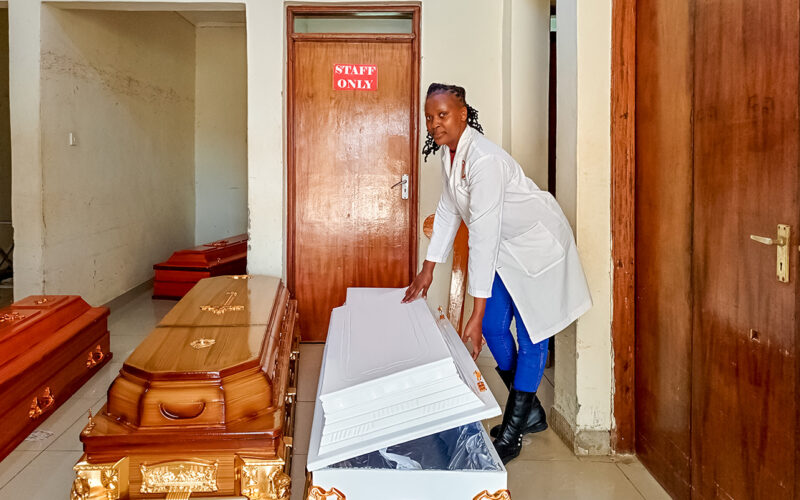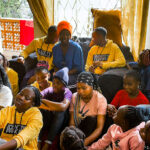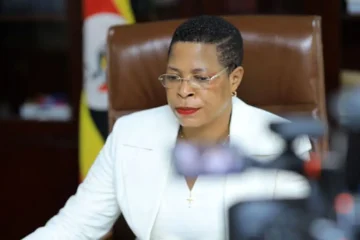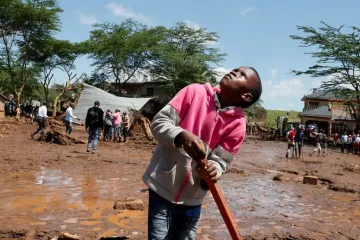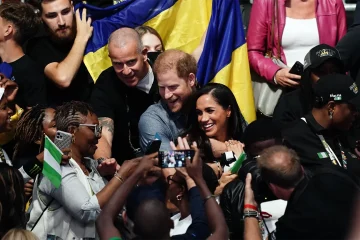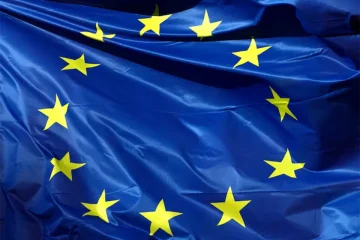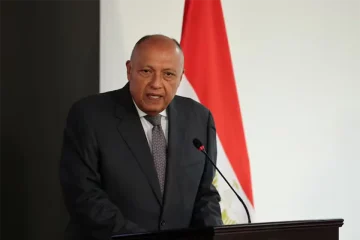26 years old and passionate about changing public perceptions of her profession, Filinda Wakuthi Kamau initially comes across as your regular TikTok influencer. That’s until you realise what her account, which has over 500,000 followers, is all about.
Kamau has a license from the Kenyan Egerton University Funeral Home as an embalmer and funeral director and is one of a new generation of young morticians taking over TikTok with their informative videos seeking to dispel common myths about morticians.
“I think the misconception most people have is that it’s dark, scary, and doom all the time, when really it’s the opposite. It’s to be of service to people. It is to make the grief lighter. It is not to make things heavier,” Kamau shared.
The member of the Morticians and Allied Professionals Association of Kenya has been working in the field since she was 19 and has prepared countless bodies for bereaved families.
“I can’t recall the actual number, but I have attended to many bodies. There are so many young people out there working as morticians, but I’m the youngest in this facility,” she explained.
Kamau’s role involves preparing the deceased for their funeral. Her daily routine consists of sanitising, cleaning, and sometimes reconstructing lifeless bodies in the event of accidents.
After this, she speaks to family members about their preferred traditions and rituals for the last rites.
To deconstruct myths about her job, Kamau uses her TikTok profile, @frimahkuthi, to share her experiences and routines and help people understand the death process better while challenging gender stereotypes associated with women working in morgues. She showcases how a younger generation is changing Africa’s funeral industry, using short-form videos.
In most of her TikTok videos, she can be seen wearing white overalls, gloves, and a face mask, inside a room where the deceased are kept in cabins.
Kamau finds fulfilment in her job and advises people to respect humanity.
“I describe myself as a proud mortician because I love my job and I work with passion. I am strong. I honour people’s last wishes, and I provide the best services to those grieving and the larger community,” she said.
Her TikTok account is an interactive channel where she shares her thoughts on death, answers commonly asked questions, and also shares the most challenging moments she faces while on the job.
A re-route led her here
Kamua did not always intend to be a mortician.
Her dream was to become a nurse or doctor. However, due to financial difficulties, she had to put her initial plans on hold.
During this time, she was introduced to the profession by a community priest, who suggested that she pursue mortuary science while waiting for her family to raise enough money for her to take a nursing course.
Because she loved science and wanted to help people in any way she could, Kamau opted to enrol in a three-month mortuary science course at the University of Nairobi, followed by a six-month internship. After completing her training, she began working at Egerton University Funeral Home.
While it may seem strange for a young woman in her mid-20s to speak passionately about a career that involves daily contact with tragedy and death, Kamau feels honoured to be able to help grieving families find peace.
“Funerals are for the living. They are meant to help those left behind remember a life. And me being able to be the go-to person for someone whose world is crashing down, means everything to me,” she said.
“Being a part of something that’s so much bigger than you is so important,” she added.
One defining career moment for Kamau was handling the victims’ remains from the 2016 Kapenguria Massacre, in which a police officer went on a rampage, killing six of his co-workers in Kapenguria Town, a sizable urban centre, some 400 kilometres from Nairobi, Kenya’s capital.
“That was a very scary moment, the scariest working part I’ve ever encountered,” she recalled.
Other emotional moments include those when she has to handle the corpses of babies.
“When I’m handling a baby, the most challenging part is that I am a mother. This makes me sad because I know the kid’s journey has been cut short by death,” she shared.
Dr. Vincent Musungu, a lecturer at the Kenya Medical Training College’s Mortuary Science Program in Kisumu, recalled that during his training in 1989, he and 95% of his classmates were all male. He noted that the graduating class of 2022 at his school was predominantly female.
According to the most recent data from the Morticians and Allied Professionals Association of Kenya, however, more than 50% of graduates from mortuary science programs in Kenya are women.
“That’s a huge flip because traditionally it’s been predominantly men and very few women. But now we’re seeing an increase in the number of women taking a bigger leap in the profession than ever before,” Musungu said.
Kamau’s TikTok content inspired Christine Ledi Liviri, a student at the Kenya Medical Training College, to join the field.
“I’m passionate about both life and death. I’ve been to several morgues, and I saw how dead people were mishandled by quacks. Then I stumbled upon Filinda’s TikTok. I was moved and decided to enter this field. I am now a student of Mortuary Science at Kenya Medical Training College in Kisumu, thanks to her content,” Liviri said.
Women morticians still face challenges
Despite all the progress, some women say they still face barriers.
Stereotypes about women not being strong enough to lift coffins or worry about exposing pregnant workers to embalming chemicals make some male funeral home owners unwilling to employ women in their practices.
“Many women in funeral services have to overcome the tendency of people thinking that they don’t belong,” Vincent disclosed.
“We’re too young. We’re too short. We’re too weak. That’s not true. That’s not true for men or women,” Liviri added.
History paints a picture of how these beliefs came to be. In Kenya, from the beginning of the 19th century, caring for the deceased was largely a woman’s responsibility.
However, when families could bring dead soldiers’ homes from distant battlefields thanks to embalming chemicals during World War 1, men started to dominate the field.
Embalming required a higher level of study, from which women were systematically excluded. The country industrialised the funeral sector and made pursuing a job in the sector easier. The narrative that women were too sentimental or squeamish to deal with death quickly led to men taking over the new death care profession.
However, with more and more women graduates available to an industry that now includes event organizing, grief counselling, and cosmetology, according to the Morticians and Allied Professionals Association of Kenya, there has been an influx of women.
“We bring a different sense of nurture to the profession and just a different eye for things,” Kamau stated.
As the market grows, Millennials and Gen-Zers are infiltrating the funeral business as youthful morticians become influential on social media.
Kamau often tackles stereotypes within the industry with a welcome sense of humour.
And she’s not alone. The social media platform, best known for dance crazes, recipes, and life hacks, has a niche community of TikTok morticians who have gone viral for their videos promoting what they call “#death positivity”, with over 95 million views globally.
“Having social media and those resources and other creators who are on social media promoting death education has definitely sort of been that catalyst for young people to be interested in the profession,” Kamau said.
Impacting the future
While she doesn’t see herself as an influencer, Kamau has unwittingly impacted the career paths of others.
“Many people have reached out and advised them on how to get started, which they did. Some even came back to intern here with me, where I guided them before they went to venture on their own,” she disclosed.
But being on TikTok has also presented a fair share of challenges for Kamau.
“Some people report my account, and it gets blocked at times with claims that I give them sleepless nights with my content, and they get abusive about my work. To deal with this, I just block the negative sentiments.”
Having access to open conversations about death and funerals has helped normalise the subject among a younger generation, one that appears less likely to be death-phobic than their parents or grandparents.
Promoting death positivity has helped Kamau get more clients. Some of her followers are even transferring dead bodies from other distant places, influenced by what they have seen on her social media account.
“You don’t just get into the trade for money or because you see someone else enjoying it. Those without the passion… quit as fast as they joined,” Kamau shared.
While her life and TikTok account are dedicated to the macabre and sometimes taboo, Kamau continues to shine a light, bringing others with her to join a career field that everyone uses but is still viewed negatively worldwide.
“I think the scariest part is what happens before death. Death is final. It’s already done. It’s not scary. I think with life comes death. It’s very natural. So I don’t think it’s scary at all,” she concluded.

